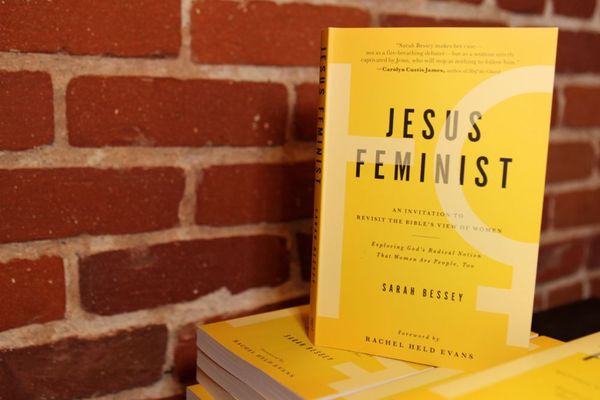
A few months ago I found myself reading a thoughtful, passionate, on point blog post from a blogger I hadn’t come across before. As I was looking at her site, I noticed that she had just published her new book, Jesus Feminist.
What? Isn’t using “Jesus” and “Feminist” in the same sentence an oxymoron? After all, doesn’t feminism bear sole responsibility for the moral decline of America, for the dissolution of the nuclear family unit? (I’ll let you decide how much you think I’m exaggerating.) I decided I wasn’t going to entertain such a notion as a “Jesus Feminist” by reading the book, but I would continue reading her blogs.
Over the next few months, as I read Sarah Bessey’s blogs and as I saw her speak at IF:Gathering, this woman impressed me deeply. She didn’t have some “I am woman; hear me roar” agenda. I could tell how in love with Jesus she was. And her passion for loving people dripped from every word she wrote.
That’s when I decided to read Jesus Feminist. (Of course, it being on sale for $1.99 on kindle at the time didn’t hurt.) I wanted to see what this beautiful soul had to say about the subject of women.
I was impressed that Sarah wove Scripture into this book as eloquently as any writer I’ve seen. I could tell she had a high view of Scripture. She wasn’t one who held a viewpoint and twisted Scripture to support it. In fact, she had such a high view of Scripture that she didn’t take the interpretative status quo but instead she sought wisdom and understanding beyond what I’ve seen most other authors do.
Growing up in church, I’ve always been taught, “Let Scripture interpret Scripture.” I love how Sarah does beautifully this on the subject of women in the church. She tackles the hard passages like ones commanding women to be silent in the church by making a case that these commands were for those women specifically for a specific reason (they were causing disorder, they were not educated to know of what they were speaking, etc.). She brings out several examples of women in other passages of the New Testament speaking in the church, leading, and prophesying. I also loved how she pointed out that Paul’s command for women, “if…they desire to learn…ask their husbands at home” was not as demeaning as it appears. If understood in the context of the culture, where women were not educated, he is actually advocating for a woman’s education in theological matters, something completely unheard of at the time.
Although this book was a fascinating read and challenged my thought in many ways, my view of some things did not change. For instance, marriage. I still believe in the absolute authority of Ephesians 5:22-33 regarding men’s and women’s roles in marriage. Yes, men and women are equal in value; there is no doubt about that. But when Paul goes to great lengths to compare marriage to the relationship between Christ and the church, where the husband is the head of the wife as Christ is the head of the church, I cannot dismiss the husband’s headship so easily. However, I do believe that if we are going to take that passage at its word, we need to remember that Jesus came to serve. He humbled himself completely and never lorded his authority over anyone. Truly, in a marriage as well as in the church, we are to look one verse above at Ephesians 5:21 and submit to one another out of reverence for Christ.
Overall, I enjoyed this book. It allowed me to see through a different lens into this subject of women and specifically the Bible’s view of women and how truly precious we are to God. I was able to see how much of my own freedoms in life were fought for by the early runners of the feminist movement – which were, by the way, Christians. I was able to see that feminism transcends the American labels we think of: equal pay for equal work, etc., and see that if women were viewed as equal in value as men across the world, victimization of women wouldn’t be as rampant as it is today.
This book is worth your read.
I’m going to leave you with some of the passages I highlighted from the book:
I pray that you would be given the gift of realizing you were wrong about some important things.
It’s dangerous to cherry-pick a few stand-alone verses, particularly when they are used as a weapon to silence and intimidate, effectively benching half the church in the midst of holy harvest season when the harvest is plentiful and the workers are few.
The curse that was laid upon Eve – her desire would be for her husband, and her pain in childbirth would be greatly multiplied, even shows how patriarchy, subordination, and pain are a part of the Fall. They were never part of God’s original intent; they are a consequence of sin.
If Christ is not at the center of the work, he is not the author of the work, the glory of the work, then it is often unfruitful and incomplete.
Stop waiting for someone else to say that you count, that you matter, that you have worth, that you have a voice, a place, that you are called. Didn’t you know, darling? The One who knit you together in your mother’s womb is the one singing these words over you, you are chosen.
